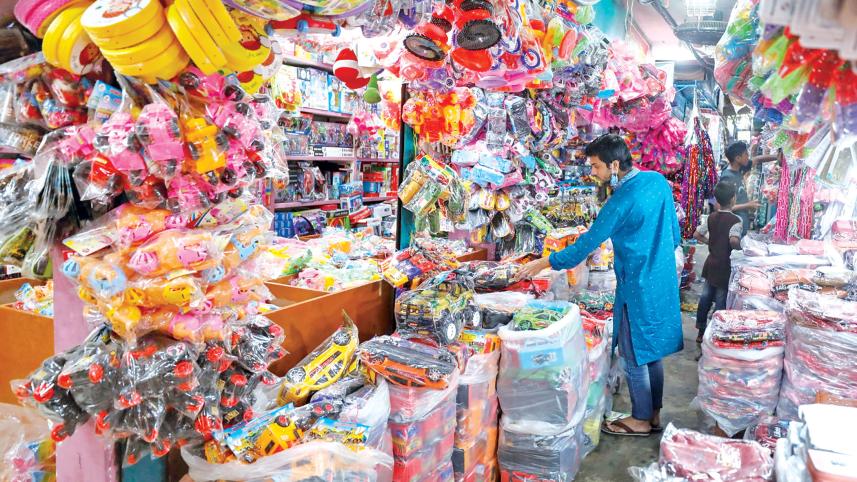Policy support needed to boost toy export: DCCI

Despite its potential to play a vital role in Bangladesh's export diversification, the toy industry is struggling with inadequate policy support, weak infrastructure, and compliance challenges, which stakeholders warn could stall its global ambitions if not urgently addressed.
"Export diversification is vital for Bangladesh, yet our exports remain overly dependent on a few products," said Taskeen Ahmed, president of the Dhaka Chamber of Commerce and Industry (DCCI).
The global toy export market is currently worth $103 billion and is projected to reach $150 billion by 2032. But Bangladesh's share is still only $77 million, a figure far below its potential, he added.
Ahmed made the remarks at a discussion on the potential of the toy industry at the DCCI office in Dhaka yesterday.
Due to a lack of necessary policy support, high tariffs on raw material imports, the absence of bonded facilities, inadequate infrastructure, and insufficient testing facilities, the potential of this sector remains largely untapped, he said.
To utilise the immense potential of this growing sector, he stressed the need for greater involvement of the education sector in innovation and enhanced coordination among government agencies.
In his keynote presentation, Shamim Ahmed, president of the Bangladesh Plastic Goods Manufacturers and Exporters Association (BPGMEA), stressed the importance of improving infrastructure and ensuring global quality and safety standards.
"Without rigorous testing and compliance mechanisms, locally manufactured toys often struggle to meet the requirements of markets in Europe and North America, limiting access to high-value destinations," he said.
Ensuring quality control is not just about production; it involves proper certification and monitoring at every stage. Without it, buyers remain cautious, he said.
The industry is also falling behind in innovation and design development due to a lack of investment in research and development, he said.
Unlike leading global players, Bangladeshi firms have limited capacity to design new products, develop advanced moulds, or introduce features that align with changing consumer preferences, according to Shamim.
He also called for policy support, including duty exemptions on spare parts and components, to help manufacturers upgrade production facilities.
According to export data, Bangladesh's toy exports have grown steadily, rising from $15.23 million in FY17 to $77 million in FY23, reaching nearly 88 countries.
Key products include tricycles, scooters, pedal cars, and dolls, with major markets in the US, Europe, Japan and China.
"If the current growth trajectory continues at an annual rate of around 24 percent, Bangladesh's toy exports could reach $466 million by 2030," said Shamim Ahmed.
Shamim Ahmed sees significant investment opportunities in Bangladesh's toy sector. Greenfield projects, technology transfer, and automation could modernise production and help local manufacturers compete with global hubs, he said.
Export-oriented units would expand the country's share of the $100 billion global toy market, while a "Made in Bangladesh" brand could boost international recognition and buyer confidence, he added.
Abdullah Al Mamun, deputy director of Waste and Chemicals Management at the Department of Environment, said, "We have moved the plastic sector into the green category."
"For manufacturers under this category, no certification renewal will be required for five years. This is a simplification of business, almost a promotion," he said.
"Since the toy industry deals with children, we expect toys to be free from toxic chemicals," he said.
He also stressed the importance of involving academia in research and enhancing capacities in energy, water, and waste management.
Muhammad Mubinul Kabir, member (Customs Policy & ICT), National Board of Revenue (NBR), said, "In order to survive in the post-LDC era, we need to focus on other potential sectors alongside the RMG sector."
"To diversify our export basket, NBR has been working to simplify policies and extend bonded facilities to businesses in other potential sectors," he said.
He mentioned that the revenue department imposes tariffs in accordance with the tariff policy formulated in 2023, and the revenue authority aligns its strategies with the recommendations provided by donor agencies to enhance efficiency and strengthen overall capacity.
He added that there is limited scope for mid-year policy changes, but during the formulation of the next national budget, the government may consider providing necessary policy support to this sector.
He further remarked that although the RMG sector has received policy support for the last 40 years, it is time to rethink its overall capacity.
Hence, toy entrepreneurs should focus more on enhancing their own skills, innovation, and product development rather than solely relying on government incentives, he said.
Martin Dawson, deputy development director at the British High Commission in Dhaka, said Bangladeshi toys have immense export potential, and the UK government is keen to provide cooperation in this regard.
If the existing policy barriers are addressed, exports to the UK could multiply significantly, he hoped.
Yasir Obaid, managing director of Cupcake Exports Limited, urged strengthening supply chains, streamlining policies, ensuring intellectual property rights, and improving coordination among government agencies.
Belal Ahmed, managing director of Golden Son Limited, said that due to the absence of a specific policy for the plastic-based toy industry, entrepreneurs are deprived of government support, hampering overall export growth.



 For all latest news, follow The Daily Star's Google News channel.
For all latest news, follow The Daily Star's Google News channel.